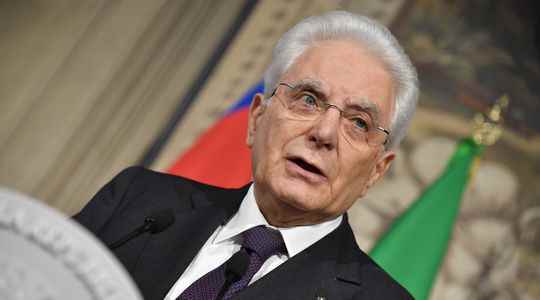Electric atmosphere in Rome, where we fear a new crisis of government. February 3 will indeed end the seven-year term of Sergio Mattarella. His successor must be elected by Parliament with representatives of the regions. Currently, no political group has sufficient weight to impose a candidate. Coming from the right or the left, the next Italian president will need the support of part of the other side to be elected.
Sergio Mattarella has made the robot portrait of his successor: a personality who will be able to divest himself of any partisan affiliation and take charge of the general interest. One man – at least – corresponds perfectly to these criteria: Mario Draghi, the current head of government. The former governor of the European Central Bank has no political affiliation. He was able to unite around him a government of national unity bringing together all the political sensitivities of the country and to convince the European allies to offer Italy 200 billion euros from the recovery plan over six years.
One year from the end of the legislature, Draghi, if promoted to the Quirinal, the seat of the Presidency of the Republic, could continue to guarantee Italy’s reliability for seven years, regardless of the results of the general elections, scheduled for next year.
For the first time in Italian history, a prime minister would then leave the government for the presidency, which would pose the problem of forming a new executive. “Can Italy do without a figure of political prestige and operational efficiency like his? This is the argument used to block his election to the Quirinal”, summarizes the professor and former minister socialist Valdo Spini. Some voters are also reluctant to vote for Draghi for less noble reasons. They fear that a new government crisis will ensue and early legislative elections, where they would lose their seats for sure. Especially at the Five Star Movement, which is losing momentum.
Caliph instead of Caliph
On the other hand, the great political leaders could find an interest in electing Draghi. Because they believed in it from the start, like the Democrat Enrico Letta [par ailleurs membre du think tank de L’Express], or because they would in return negotiate a good place in a reshuffled government, like the legist Salvini or his ally of Fratelli d’Italia Giorgia Meloni, who would see himself as caliph instead of the caliph. Even Giuseppe Conte could gain the legitimacy he lacks at the head of the 5 Stars. But the chiefs face many dissonant voices within their formations.
It is in this cacophony that the candidacy of the indestructible Silvio Berlusconi could be taken seriously. At 85, the former Prime Minister has served his sentence for tax evasion but is still embroiled in a trial over his infamous “Bunga Bunga” sulphurous parties, a serious handicap for any candidate for the supreme office. The billionaire also suffered from a series of health problems, including hospitalization due to Covid in September 2020. He announced on Saturday January 22 that he was renouncing to be a candidate for the presidency of the Republic. Eternal returning from politics whose history of the last 30 years merges with that of Italy, he sees his dream of becoming head of state definitively vanish. “I will continue to serve my country in other ways,” he said on Saturday evening, assuring that he had the number of supporters necessary to be elected to the presidency but would renounce them out of a spirit of “national responsibility”. The scandals in which he was involved, his legendary blunders and his repeated trials, got the better of his ultimate ambition.
An “emergency situation”
From right to left, a good dozen other candidates were considered. None seems to have brought together the parties present in the government of national salvation. To the point that some are leaning towards an ad minima solution with the extension of the mandate of Sergio Mattarella, 80, even if he has publicly announced his wish to retire.
From this Monday, the electors will vote by secret ballot, by a two-thirds majority for the first three ballots, and by an absolute majority thereafter. Without prior agreement, the case can last for days. However, to move forward with the reforms required by the European recovery plan, Italy cannot afford to have a badly elected president and a pitched battle between the parties. “In 1992, recalls Valdo Spini, the election seemed very difficult, ballot after ballot, and then there was the tragedy of the assassination of Judge Falcone and in 24 hours we decided to elect the President of the Chamber MPs. The context today is very different, but we are also in an emergency situation.” A health, social and economic emergency, after three years of Covid.
Backend fetch failed
Meditation Guru:
XID: 114603777
Varnish cache server
